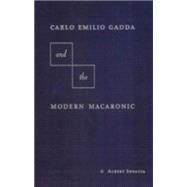Carlo Emilio Gadda and the Modern Macaronic
, by Sbragia, Albert- ISBN: 9780813014630 | 0813014638
- Cover: Hardcover
- Copyright: 10/1/1996
"An original and significant contribution to the field of modern Italian literary studies. . . . A comprehensive overview of Gadda's entire production, but also a thoughtful and well-argued general interpretation."--Robert S. Dombroski, CUNY Graduate School "Illuminating and compelling. . . . Highlights modernism's concern not so much for concrete or stark reality (as in the 19th-century novel) but for the motion or even the vortex that starts with reality but that re-creates itself in the language of literary fiction."--Gregory L. Lucente, University of Michigan Carlo Emilio Gadda (1893-1973) is generally considered in his native Italy to be "the one novelist that the country has produced who deserves to be spoken of in the same breath as Musil, Joyce, and Proust." This study is the first full historical and thematic appreciation of him in English. It provides a precise, thorough biography, with particular emphasis on his involvement in World War I and Italian Fascism, and is based on the most recent editions of his works, his unpublished manuscripts, and his correspondence. Gadda's prose is characterized by a linguistic expressionism and a grotesque and baroque fantasy emblematic of a longstanding polyphonic and plurilingual tradition in Italian literature called the macaronic. Because of this complexity, he has remained largely unknown in the English-speaking world. Sbragia situates him in an expressionistic tradition that includes James Joyce and Louis-Ferdinand Céline--a tradition, Sbragia argues, with its immediate roots in the modernist crisis of realist and linguistic mimesis. He traces this tradition from the Renaissance authors Teofilo Folengo and François Rabelais to the Romantics and Flaubert, and, in the case of Gadda, to the plurilingualism of the Italian peninsula. Albert Sbragia is associate professor of Italian at the University of Washington, Seattle, and author of articles in MLN, Italiana, Modern Fiction Studies, and Forum Italicum.







